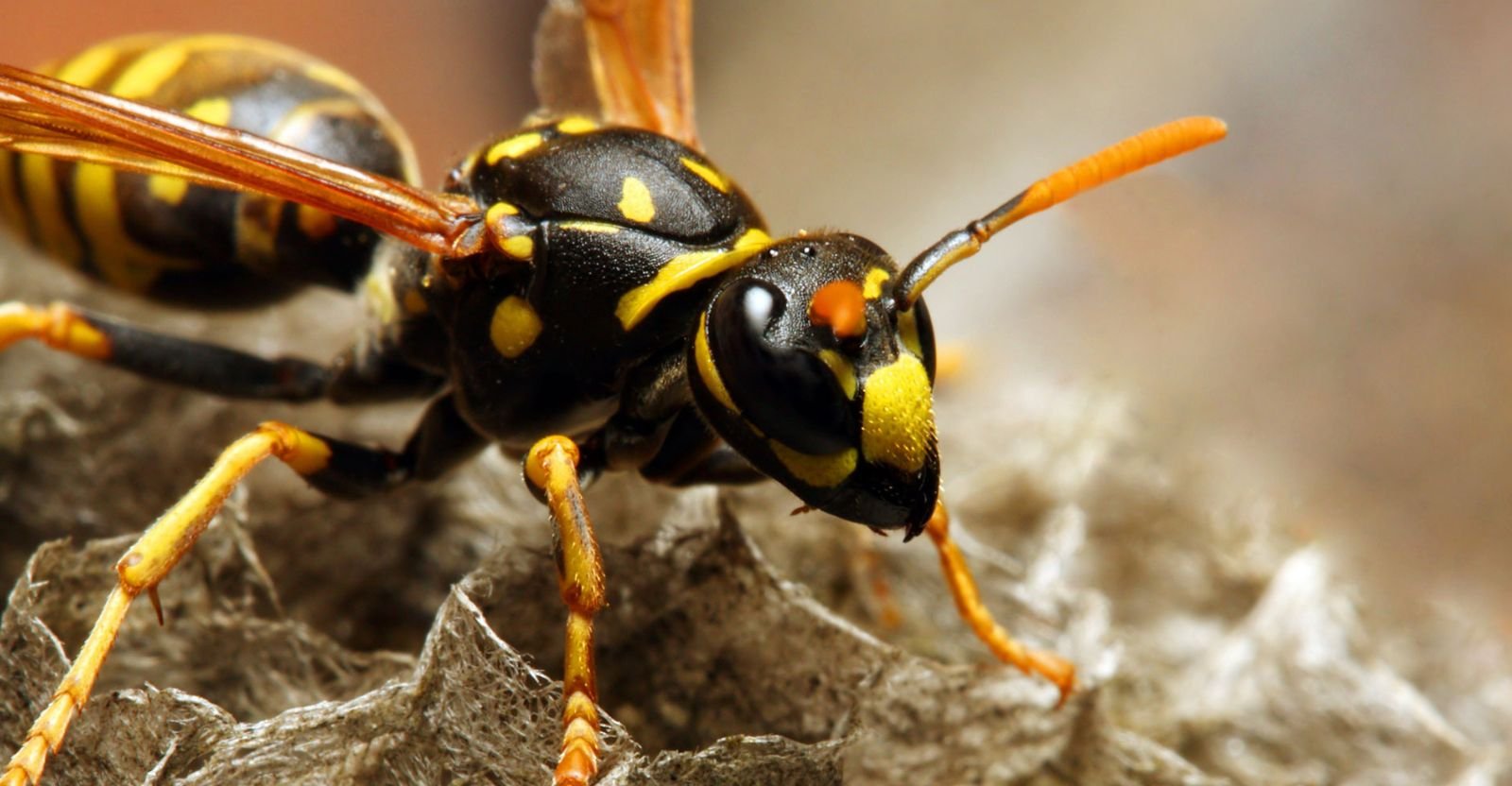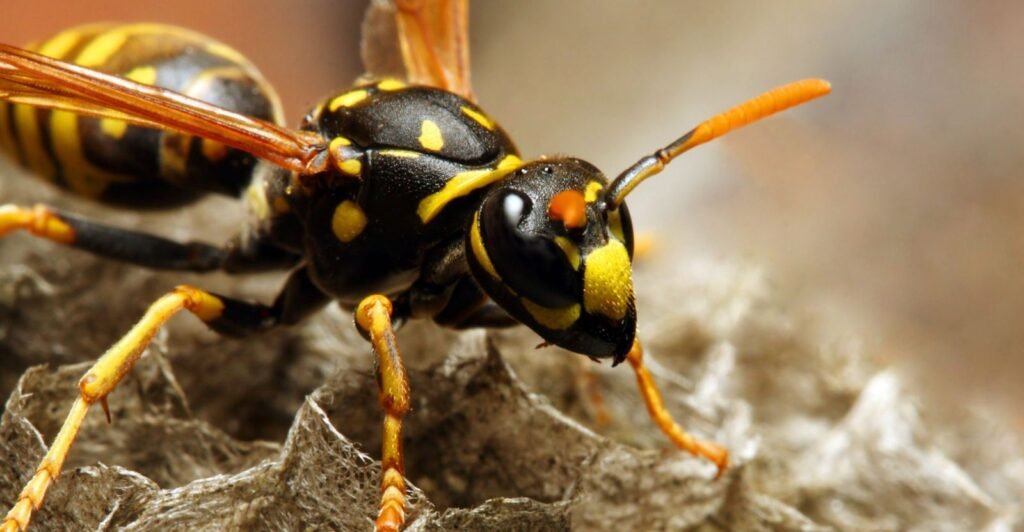
How Long Do Wasps Live?
If you’ve ever had a painful encounter with a wasp, you probably know that a sting can be quite uncomfortable, and in some cases, even dangerous. Wasps inject venom that causes pain, swelling, and itching due to the presence of certain chemicals like serine protease and acids. Fortunately, only female wasps have stingers and venom glands, so it’s the females that cause most of the trouble.
But how long do these little insects live? Well, wasps typically live for about four to six weeks, though their lifespan can vary depending on the species. Some wasp queens, on the other hand, can live for up to 8 to 10 months.
While most wasps die before reaching their full lifespan, their numbers are often huge, with a single nest containing anywhere from 5,000 to 10,000 wasps. These buzzing insects play an important role in nature—they’re pollinators and can help control pest populations that damage plants. Let’s take a deeper look at the wasp life cycle and how you can deal with them.
How Long Do Wasps Live?
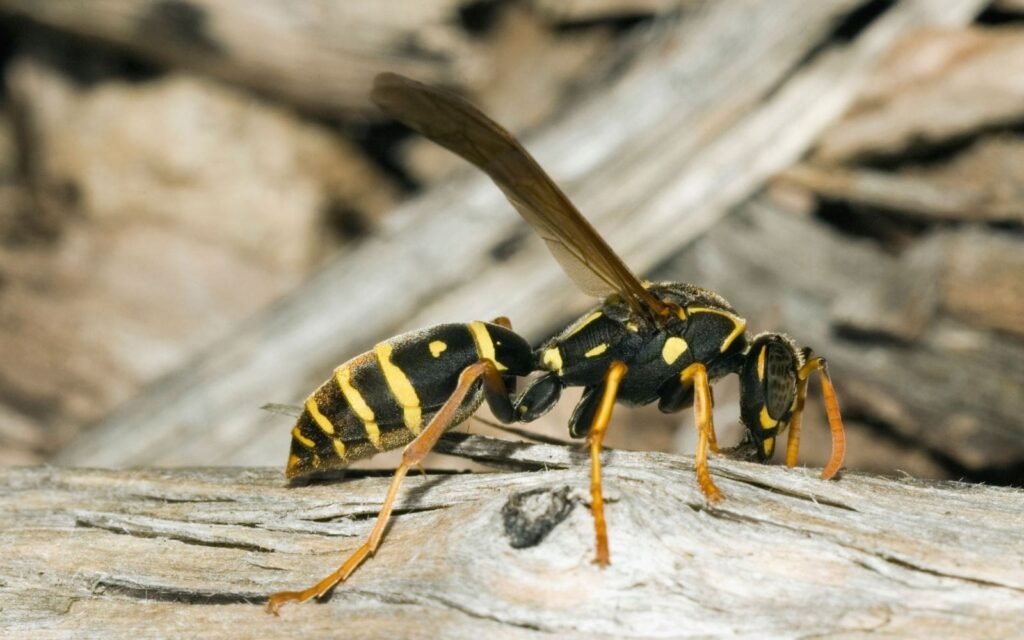
Wasps are social insects, so they usually live in colonies, although some species are solitary. The lifespan of a wasp depends largely on its species, but on average, adult wasps live about four to six weeks. Queen wasps are the exception and can survive for 8 to 10 months.
The paper wasp, a common species found around homes and gardens, belongs to the Polistes genus and can be found in over 200 species worldwide. These wasps are known for building their nests in the spring and summer, and their colonies typically last for 200 days. Within that period, the colony will go through four generations, including the egg, larva, and pupa stages.
From egg to adult, a typical paper wasp’s lifecycle looks like this:
- Egg: Eggs hatch in about 13 days.
- Larvae: The larvae stage lasts about 24 days, going through 5 instars before pupating.
- Pupa: The larvae turns into a pupa for about 22 days.
- Adult: Adult wasps usually live about 38 days.
If the wasp is indoors and doesn’t have access to food and water, it may only survive up to 10 days.
What Is the Life Cycle of a Wasp?
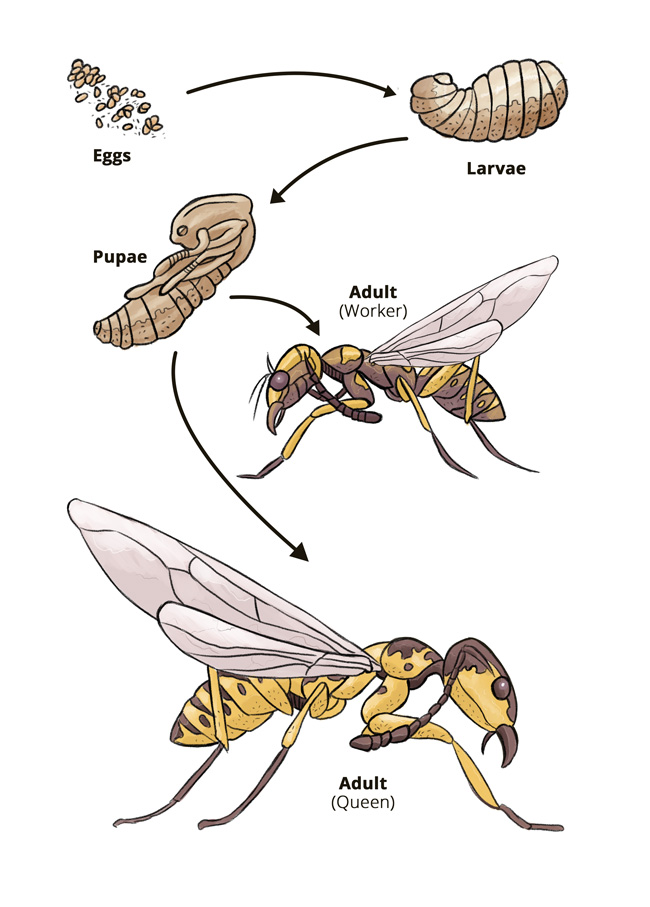
The wasp life cycle consists of four stages: egg, larva, pupa, and adult.
- Egg Stage: The egg is vulnerable and relies on being placed in an ideal environment by the mother wasp.
- Larvae Stage: After hatching, the larva feeds and molts periodically. It stays in this stage for about three weeks.
- Pupa Stage: The larvae then transforms into a pupa, encased in a protective silk cocoon, where it remains until it matures into an adult.
- Adult Stage: Once the adult emerges from the cocoon, it starts its feeding cycle and contributes to the colony.
Where Do Wasps Build Their Nests?
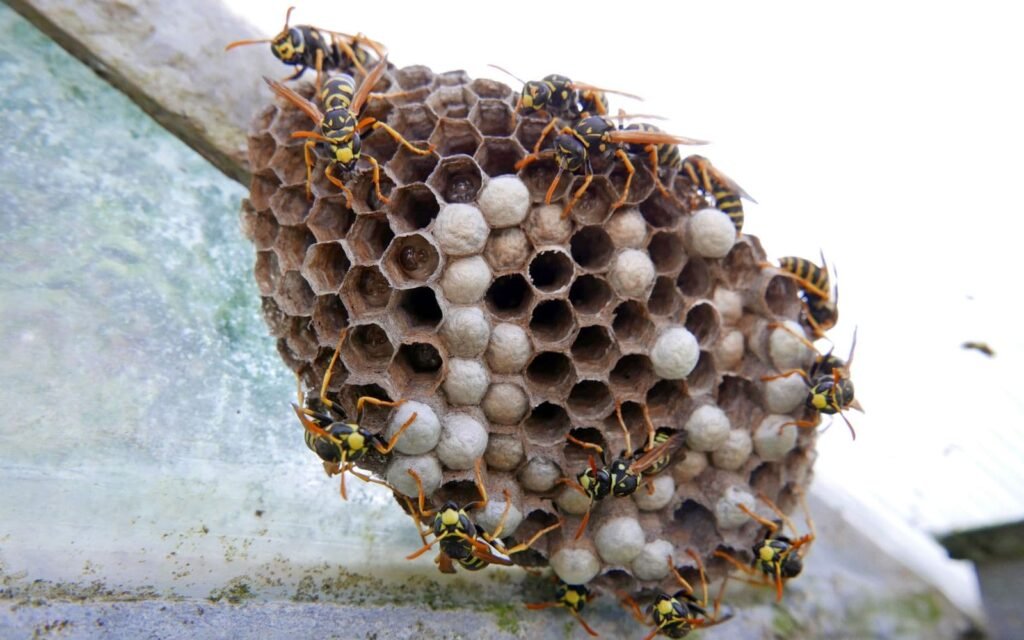
Wasps are great at building their nests in secluded, protected places. You’ll often find them in dark, dry areas like attics, sheds, cellars, or tucked away in the corners of buildings. They can also build their nests in open areas, such as tree branches or even underground.
The nests are made from a paper-like substance, which is chewed-up wood, plant stems, and saliva. This substance, known as carton, is used to create their nests and is made from a mix of wood pulp and insect parts.
How to Get Rid of Wasps and Prevent Them from Coming Back
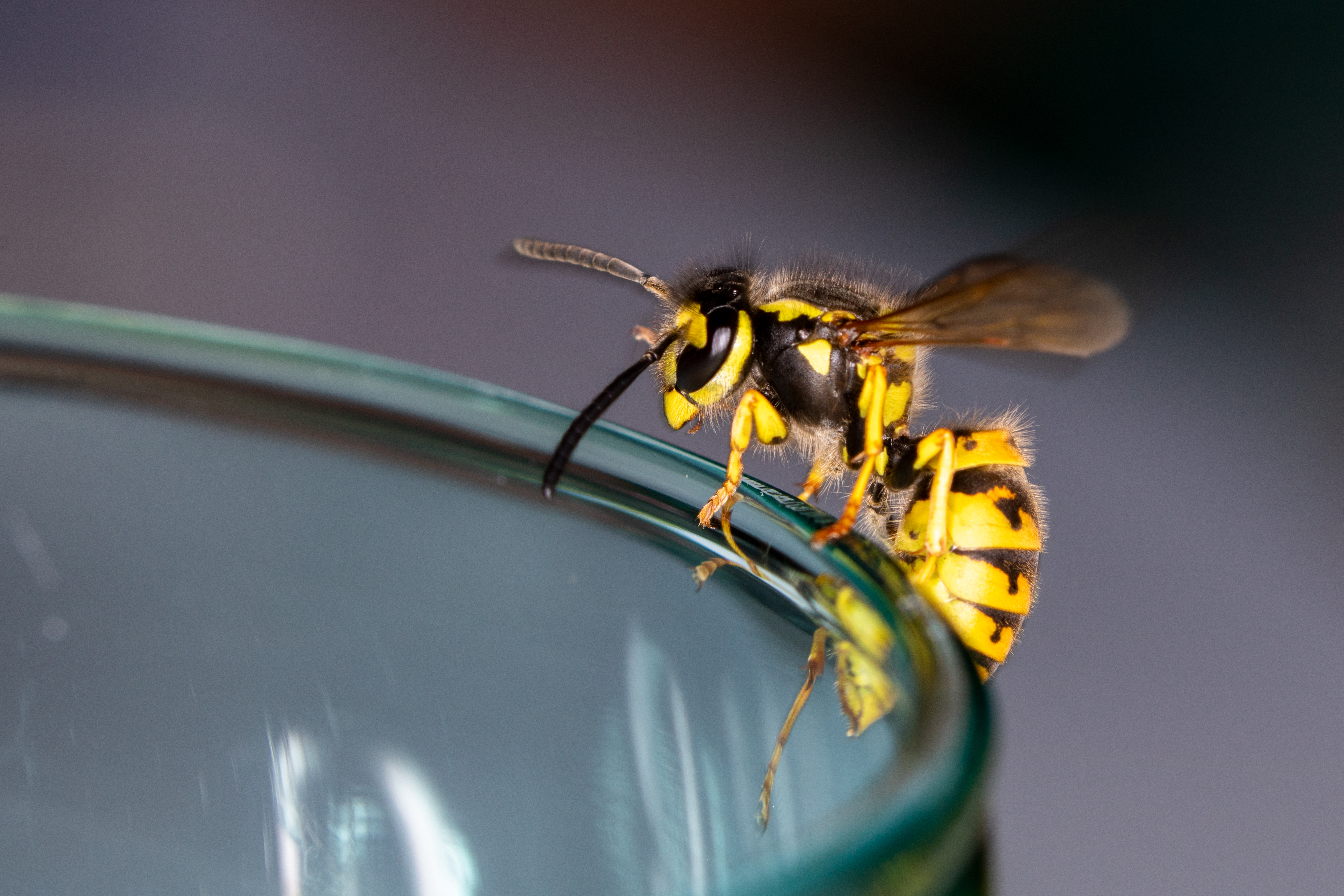
If you have a wasp nest in your yard or around your house, it can be more than just an annoyance—it can become a health hazard. Wasps are attracted to sweet foods, like sodas, fruits, syrups, and candies, so keeping food uncovered can invite them. Here are some ways to deal with wasps:
- Remove small nests early: When a queen first starts building her nest, remove it early to prevent it from growing. This is the time to kill the queen and stop the colony from forming.
- DIY wasp trap: Fill a glass with water and a few drops of dish soap. Place the glass against the nest entrance. The wasps will drown, and the nest will be destroyed.
- Commercial wasp sprays: These sprays are designed to disintegrate the nest and kill any eggs or the queen inside.
- Underground nests: You can drown underground nests at night with water, or use fire to burn them—but be careful with fire.
- Invite natural predators: Birds like bluebirds, sparrows, and chickadees will help reduce wasp populations, as will reptiles like geckos and lizards. Installing a bird feeder in your garden can encourage these predators to visit.
- Wasp traps: There are commercial traps that work well and are safe to use.
What’s the Difference Between Bees and Wasps?

At first glance, bees and wasps look similar, but there are key differences:
- Body Shape: Wasps are generally more streamlined and smooth, while bees have hairy bodies designed to collect pollen.
- Behavior: Wasps are usually more aggressive and predatory. Bees are focused on pollination and rarely sting unless threatened.
- Mouthparts: Wasps have a more predatory mouth, while bees have a long tongue for sucking nectar from flowers.
Do Wasps Nest in the Same Place Year After Year?
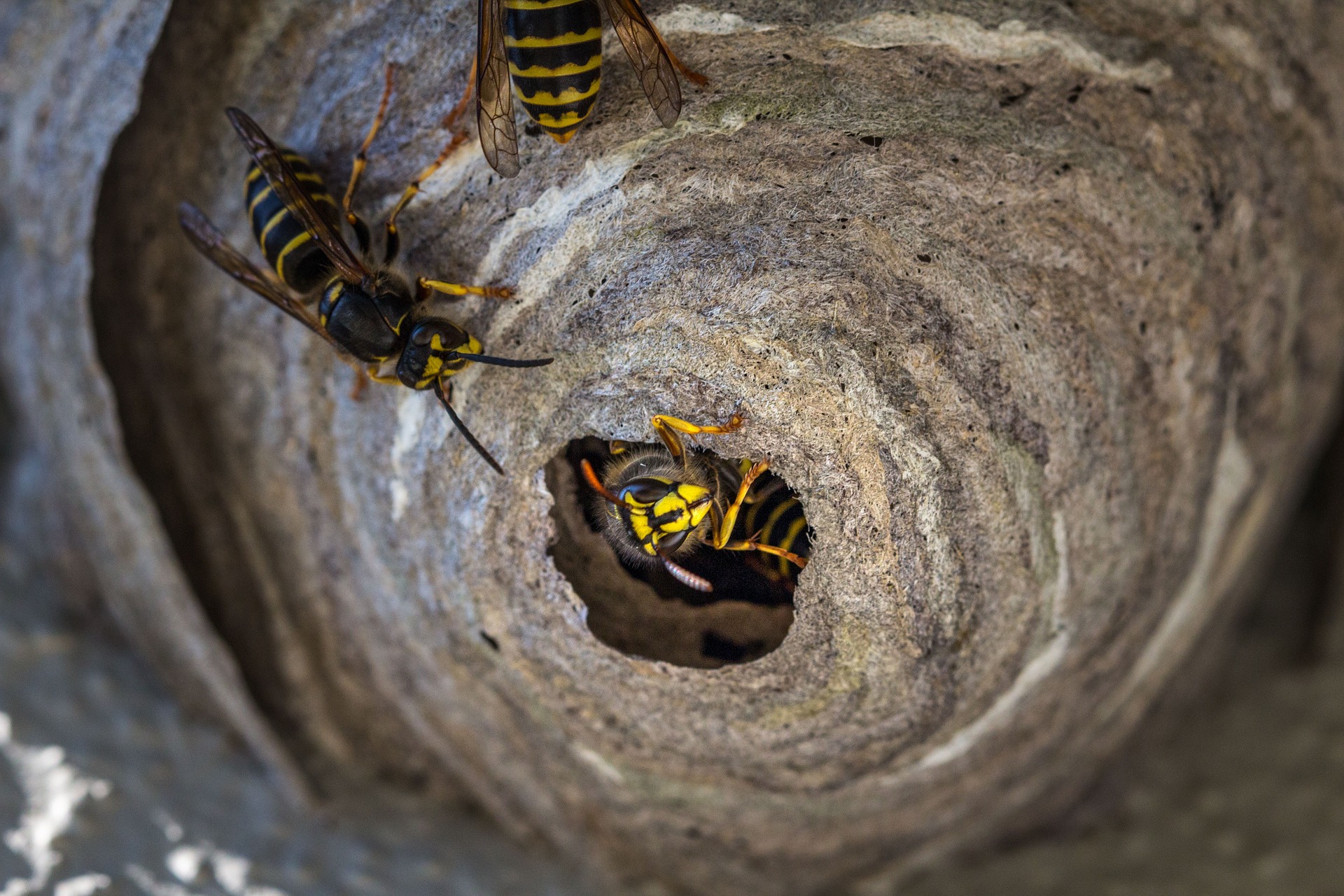
Unlike bees, which may return to the same spot, wasps do not typically reuse the same nesting site year after year. However, they may build new nests in the same location if the spot remains favorable. Wasps like to nest in warm, isolated spots with protection from predators, which is why you often find nests in attics, roofs, or small gaps in buildings.
How to Get a Wasp Out of Your Home
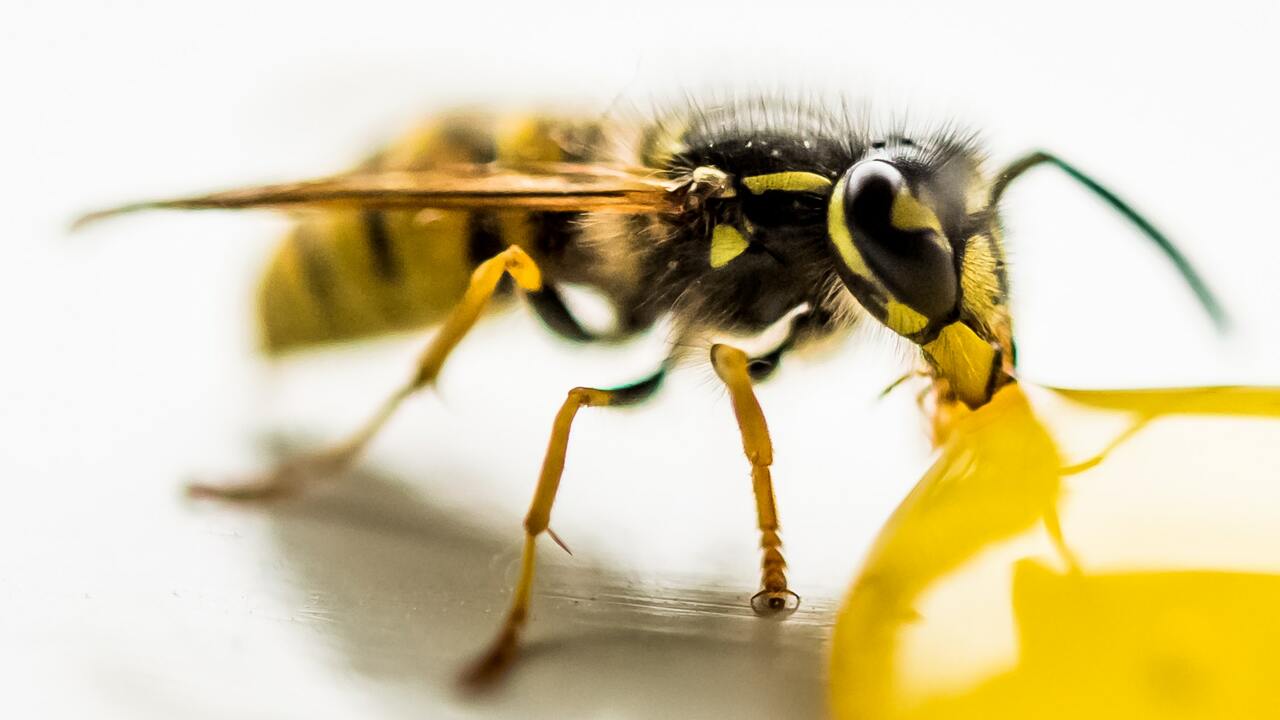
If a wasp has flown into your home, it can be tricky to get it out. The best way to do it is:
- Use a towel or paper: Gently wave the towel toward the wasp, guiding it toward an open door.
- Open the door quickly: Once the wasp is near the door, quickly open it and let the wasp fly out.
Wasps tend to enter homes in the late summer or on warm days, attracted by food and warmth. To avoid them getting inside, try to keep windows and doors closed, or use a door shield that allows air to flow but keeps insects out.
FAQs for Dealing with Wasps
1. What is the life cycle of a wasp?
Wasps typically live for 4-6 weeks. In the spring, a fertilized queen starts a new colony by laying eggs that hatch into workers. These workers build the nest and care for the larvae. As summer progresses, new queens and male wasps are produced, and the colony continues to grow. By fall, the colony dies, and only the fertilized queens survive to hibernate through winter.
2. How can I tell if there’s a wasp nest near my home?
Look for increased wasp activity around your home, especially in areas like eaves, sheds, attics, or trees. Wasps tend to hover near their nests. You might also notice a paper-like structure hanging from a tree or hidden in an overhang, which is a sign of a wasp nest.
3. Are wasps dangerous to humans?
While wasps are generally not aggressive, they can become defensive if they feel their nest is threatened. Stings are painful and can cause allergic reactions in some people. If stung, it’s important to remove the stinger immediately and seek medical attention if needed, especially if you have a known allergy to stings.
4. How can I prevent wasps from building nests around my home?
To prevent wasp nests, regularly inspect areas around your home where wasps might nest, such as eaves, roof spaces, and under decks. Seal cracks or holes in the exterior of your house, as these can be entry points for queens looking to build a nest. Additionally, removing food sources and keeping garbage tightly sealed can reduce the attraction for wasps.
5. What should I do if I find a wasp nest in my yard?
If you find a wasp nest, it’s best to avoid disturbing it. Wasps can become aggressive when they feel their nest is in danger. If the nest is small and accessible, you can try to remove it using a wasp-specific spray available in stores. However, for larger colonies or nests in hard-to-reach places, it’s safest to call a pest control professional.
6. Can I use natural remedies to repel wasps?
Yes, natural remedies such as essential oils (peppermint, citronella, and eucalyptus) can be used as wasp repellents. You can make a spray by diluting these oils with water and spraying around areas where wasps frequent. Hanging decoy nests (since wasps are territorial) can also discourage new colonies from setting up nearby.
7. Are there any foods that attract wasps?
Wasps are attracted to sugary foods, meats, and sweet drinks, especially in late summer and fall. Keep outdoor areas clean by covering food and drinks, sealing trash cans, and keeping fruit trees picked clean to avoid attracting wasps to your yard.
8. How can I get rid of a wasp nest safely?
To remove a wasp nest, it’s best to do it during nighttime when wasps are less active. Wear protective clothing (including gloves and long sleeves) and use a wasp-killing spray. Stand at a safe distance and apply the spray directly into the entrance of the nest. If you are unsure, it’s safest to call a pest control expert.
9. How do I treat a wasp sting?
If stung by a wasp, clean the area with soap and water to prevent infection. Apply a cold compress to reduce swelling and pain. If the sting site becomes red, itchy, or swollen, take an antihistamine or use hydrocortisone cream. If you experience any signs of an allergic reaction (difficulty breathing, swelling in the throat), seek immediate medical help.
10. Are wasp traps effective?
Wasp traps can be effective for catching individual wasps but may not significantly reduce a large nest population. These traps use bait to attract wasps, and once they enter, they become trapped inside. However, they are more effective in reducing the number of wasps near your home rather than completely eliminating a nest.
11. Can wasps help with pest control?
Yes, wasps play an important role in controlling pest populations. Many wasp species are predators of other insects, such as caterpillars, aphids, and flies. While they can be a nuisance to humans, they provide natural pest control in gardens and agricultural settings.
12. Is it safe to handle a wasp nest?
No, handling a wasp nest is not safe. Wasps can become highly aggressive if they feel their nest is threatened, and attempting to handle or remove the nest without proper precautions can lead to multiple stings. If you need to remove a nest, it’s best to call a professional pest control service.
Conclusion
Wasps play an important role in the ecosystem, but they can be a nuisance or pose a risk to humans when they build nests near our homes. By understanding their life cycle, taking precautions to prevent infestations, and handling them safely, you can minimize the potential for conflict with these fascinating creatures. Whether you’re dealing with a small nest or a larger colony, staying informed and cautious will help you manage wasps effectively and safely.

